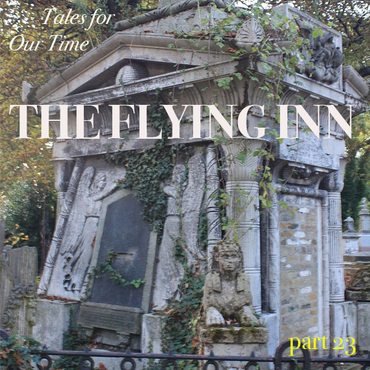Programming note: Steyn will be doing double-duty on Serenade Radio tomorrow, Sunday, hosting the pre-dawn broadcast of Mark Steyn on the Town at 5am British Summer Time - that's 12 midnight Eastern/9pm Pacific on Saturday in North America - and back with Steyn's Song of the Week at the other end of the day: 5.30pm London/12.30pm New York. You can listen from almost anywhere on the planet by clicking the button at top right here.
~Thank you for all your kind comments on our latest Tale for Our Time. The Flying Inn has been running for three weeks now, and we are beginning to hear from dissatisfied customers. From the deranged Dominion of Canada, Nicola Timmerman writes:
Interesting tale of the seductiveness of Islam and the poison of nihilism. But I have to say it is a long shaggy donkey tale with some rambling songs which you heroically sang. One only wonders what the next tale will be - Island by Aldous Huxley?
From the almost as deranged Dominion of New Zealand, Veronica writes:
If Dalroy and Pump are supposed to typify a traditional English way of life, not perfect by any means but warm and real and anchored in something beyond themselves, and Lord Ivywood is intended as the antithesis of all that, epitomizing the dangers of Power, Money, Modernism, Atheism and Progressivism all wrapped up into one superbly evil package (the 'breaking of the barriers' exchange was truly chilling!) then why bring Islam into it?
Wouldn't the clash between native tradition and 'futurist' modernity, poetry and emptiness, good and evil that Dalroy/Pump versus Ivywood represents be enough?
Chesterton clearly had no real interest in Islam as a religion, its doctrine and history hardly gets a mention let alone a critique, rather his chief interest seems to be in Islam's aesthetical and comical possibilities (the Prophet of the Moon is a ludicrous figure but also quite charming in his own way) plus its status as a kind of vague cultural rival.
Adopting the crescent as a symbol of Progressivism is a clever conceit but, again, contains nothing much of doctrine, only the unending ability of men such as Ivywood to exceed the limits and reshape all narratives, even foreign ones, to suit themselves.
Perhaps Chesterton thought he needed Islam as an exotic 'oppositional' force because the bloodless Ivywood with his cold eyes and soulless vision of the future wasn't going to cut it on his own?
Ah, well. Wait till our final episode, Veronica, in which Chesterton supplies the one element of today's west about which he has not hitherto seemed quite so prescient.
Which brings us to Part Twenty-Three of our Tale. In tonight's episode of The Flying Inn, Dorian the poet treats us to his latest poem - which these days is Chesterton's best-known poem:
Before the Roman came to Rye or out to Severn strode,
The rolling English drunkard made the rolling English road.
A reeling road, a rolling road, that rambles round the shire,
And after him the parson ran, the sexton and the squire.
A merry road, a mazy road, and such as we did tread
That night we went to Birmingham by way of Beachy Head.
English is not best-suited to heptameters, but Chesterton pulls it off beautifully and makes it very onomatopoaeic - the very sound of a soused man staggering erratically and blazing a trail that endures for millennia. And just as the alliteration of the final line starts to wear - Birmingham by way of Beachy Head, Glastonbury by way of Goodwin Sands - he abandons it in the closing stanza:
For there is good news yet to hear and fine things to be seen,
Before we go to Paradise by way of Kensal Green.
That's a reference to Kensal Green Cemetery (top right), one of the largest in London.
Members of The Mark Steyn Club can hear me read Part Twenty-Three of our adventure simply by clicking here and logging-in. Earlier episodes can be found here.
If you've only joined our club as recently as Harry Royle and missed our earlier serials (Conan Doyle's The Tragedy of the Korosko, H G Wells's The Time Machine, George Orwell's Nineteen Eighty-Four, plus Kipling, Dickens, Gogol, Kafka, Conrad, Baroness Orczy, Jane Austen, John Buchan, L M Montgomery, Scott Fitzgerald, Victor Hugo and more), you can find them all here in an easily accessible Netflix-style tile format.
If you have friends who might appreciate Tales for Our Time, we have a special Steyn Club Gift Membership that lets them in on that and all the other fun in The Mark Steyn Club. To become a member, please click here.
Please join me tomorrow for Part Twenty-Four of The Flying Inn.


